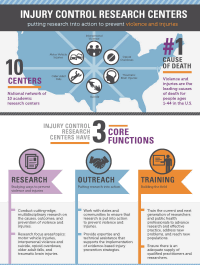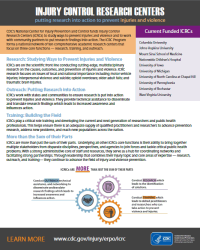About the ICRC Program
Injury Control Research Centers (ICRCs) put research into action to prevent injuries and violence. ICRCs are more than just the sum of their parts. Underlying all other ICRCs core functions is their ability to bring together multiple stakeholders from disparate disciplines, perspectives, and agencies to join forces and tackle critical public health problems. Through leadership that combines their injury topic and core areas of expertise — research, outreach, and training — they continue to advance the field of injury and violence prevention.
Research: Studying Ways to Prevent Injuries and Violence
ICRCs are on the scientific front line conducting cutting-edge, multidisciplinary research on the causes, outcomes, and prevention of injuries and violence. ICRC research focuses on issues of local and national importance including motor vehicle injuries; interpersonal violence and suicide; opioid overdoses; older adult falls; and traumatic brain injuries.
Outreach: Putting Research into Action
ICRCs work with states and communities to ensure research is put into action to prevent injuries and violence. They provide technical assistance to disseminate and translate research findings which leads to increased awareness and influences action.
Training: Building the Field
ICRCs play a critical role training and developing the current and next generation of researchers and public health professionals. This helps ensure there is an adequate supply of qualified practitioners and researchers to advance prevention research, address new problems, and reach new populations across the nation.
- Page last reviewed: February 1, 2017
- Page last updated: February 1, 2017
- Content Source:
- Centers for Disease Control and Prevention, National Center for Injury Prevention and Control


 ShareCompartir
ShareCompartir

